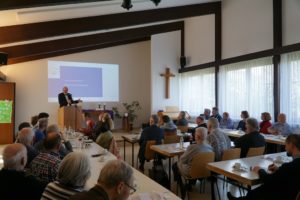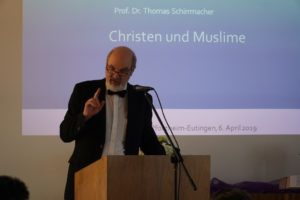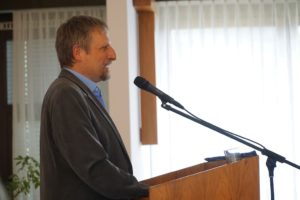Study Day of Evangelical Groups in the Regional Church Baden
idea press release, reproduction and translation with kind permission
It doesn’t take much to get into conversation with Muslims.
“All you need for a successful dialogue is a cup or two filled with tea. And through this hospitality we can make a vital political contribution to integration.”

Thomas Schirrmacher during his presentation © BQ/Warnecke
These are words of the Associate Secretary General of the World Evangelical Alliance, Thomas Schirrmacher (Bonn), at a study day of the “Network of Protestant Christians in Baden” and the “Christ Movement Baden” on April 6th in Pforzheim. The occasion was the “Dialogue Paper Christians and Muslims” of the Protestant Regional Church in Baden. It is to be discussed until the end of 2019 and adopted in 2020. In a previous report, Schirrmacher had criticized that it ignored essential topics, such as the question of the salvation of the faithful. Christian concepts, such as God’s mercy, would be uncritically transferred to Islam. At the study day he said that not only Christians with a relativistic understanding of truth are in dialogue with Muslims:
“On a worldwide scale it is precisely those Christians who are convinced of the truth of their own faith who conduct the dialogue with Muslims most intensively.”
Why Muslims pray for Mohammed

Thomas Schirrmacher during his presentation (close-up) © BQ/Warnecke
Schirrmacher warned against leveling out existing doctrinal differences, even if terms were similar. The “DNA of the two religions” would differ fundamentally in many areas. As an example he cited the image of God: The core of the Christian faith is the “greatest possible closeness to God” which one can imagine. For Muslims, on the other hand, the freedom of God and thus also the concern about a usurpation of God by believers is predominant. That God or his Spirit dwells in the heart of a person is unthinkable for a Muslim believer. The Christian idea of having a meal fellowship with God and Jesus in eternity is also extremely alien to Muslims.
“Although Muslims imagine life after death as ‘paradise’, the closeness of God does not play a role.”
Muslims pray five times a day for their prophet Mohammed, because even he could not know whether he would one day be with God.
Discussions lead to disputes

Tobias Schultz, longtime director of Operation Mobilisation (OM) Germany and now working for the Arab world as well as in refugee work in Germany, during his presentation © BQ/Warnecke
Tobias Schultz (Mosbach), the long-standing director of OM Germany, warned against engaging in theological discussions about the Trinity or the divinity of Jesus. The theologian and expert on Islam said that the framework of Islamic doctrine was so different that one could hardly make any progress by arguments alone.
“Discussions about the teachings of the two religions almost inevitably result in debates; biblical stories, on the other hand, reach the heart and can bring about change therein.”
He recommended telling stories from the Bible and reading them together: Stories from the Old Testament about creation, the Fall or the hope of salvation by the Messiah. Also miracle stories from the New Testament about the special authority of Jesus are well suited for this.





Leave a Reply